Yutao Zhang
Kimi K2.5: Visual Agentic Intelligence
Feb 02, 2026Abstract:We introduce Kimi K2.5, an open-source multimodal agentic model designed to advance general agentic intelligence. K2.5 emphasizes the joint optimization of text and vision so that two modalities enhance each other. This includes a series of techniques such as joint text-vision pre-training, zero-vision SFT, and joint text-vision reinforcement learning. Building on this multimodal foundation, K2.5 introduces Agent Swarm, a self-directed parallel agent orchestration framework that dynamically decomposes complex tasks into heterogeneous sub-problems and executes them concurrently. Extensive evaluations show that Kimi K2.5 achieves state-of-the-art results across various domains including coding, vision, reasoning, and agentic tasks. Agent Swarm also reduces latency by up to $4.5\times$ over single-agent baselines. We release the post-trained Kimi K2.5 model checkpoint to facilitate future research and real-world applications of agentic intelligence.
Kimi K2: Open Agentic Intelligence
Jul 28, 2025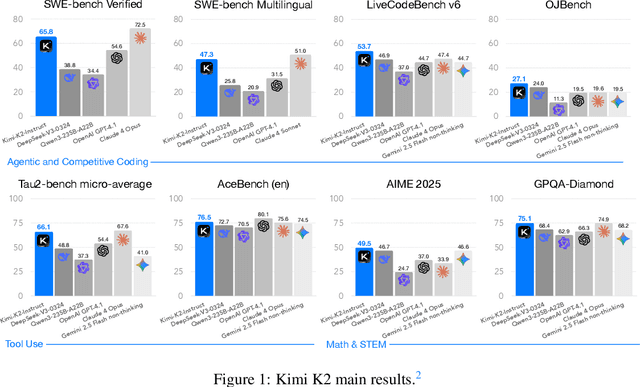


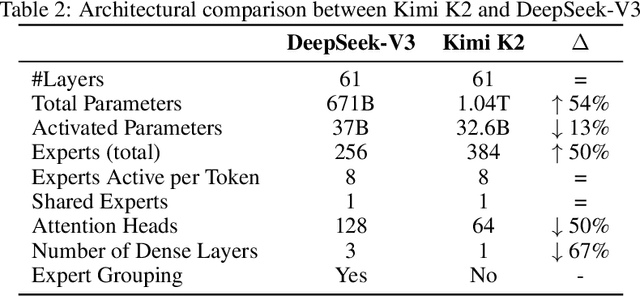
Abstract:We introduce Kimi K2, a Mixture-of-Experts (MoE) large language model with 32 billion activated parameters and 1 trillion total parameters. We propose the MuonClip optimizer, which improves upon Muon with a novel QK-clip technique to address training instability while enjoying the advanced token efficiency of Muon. Based on MuonClip, K2 was pre-trained on 15.5 trillion tokens with zero loss spike. During post-training, K2 undergoes a multi-stage post-training process, highlighted by a large-scale agentic data synthesis pipeline and a joint reinforcement learning (RL) stage, where the model improves its capabilities through interactions with real and synthetic environments. Kimi K2 achieves state-of-the-art performance among open-source non-thinking models, with strengths in agentic capabilities. Notably, K2 obtains 66.1 on Tau2-Bench, 76.5 on ACEBench (En), 65.8 on SWE-Bench Verified, and 47.3 on SWE-Bench Multilingual -- surpassing most open and closed-sourced baselines in non-thinking settings. It also exhibits strong capabilities in coding, mathematics, and reasoning tasks, with a score of 53.7 on LiveCodeBench v6, 49.5 on AIME 2025, 75.1 on GPQA-Diamond, and 27.1 on OJBench, all without extended thinking. These results position Kimi K2 as one of the most capable open-source large language models to date, particularly in software engineering and agentic tasks. We release our base and post-trained model checkpoints to facilitate future research and applications of agentic intelligence.
GLM-4.1V-Thinking: Towards Versatile Multimodal Reasoning with Scalable Reinforcement Learning
Jul 02, 2025



Abstract:We present GLM-4.1V-Thinking, a vision-language model (VLM) designed to advance general-purpose multimodal understanding and reasoning. In this report, we share our key findings in the development of the reasoning-centric training framework. We first develop a capable vision foundation model with significant potential through large-scale pre-training, which arguably sets the upper bound for the final performance. We then propose Reinforcement Learning with Curriculum Sampling (RLCS) to unlock the full potential of the model, leading to comprehensive capability enhancement across a diverse range of tasks, including STEM problem solving, video understanding, content recognition, coding, grounding, GUI-based agents, and long document understanding. We open-source GLM-4.1V-9B-Thinking, which achieves state-of-the-art performance among models of comparable size. In a comprehensive evaluation across 28 public benchmarks, our model outperforms Qwen2.5-VL-7B on nearly all tasks and achieves comparable or even superior performance on 18 benchmarks relative to the significantly larger Qwen2.5-VL-72B. Notably, GLM-4.1V-9B-Thinking also demonstrates competitive or superior performance compared to closed-source models such as GPT-4o on challenging tasks including long document understanding and STEM reasoning, further underscoring its strong capabilities. Code, models and more information are released at https://github.com/THUDM/GLM-4.1V-Thinking.
Kimi-Audio Technical Report
Apr 25, 2025



Abstract:We present Kimi-Audio, an open-source audio foundation model that excels in audio understanding, generation, and conversation. We detail the practices in building Kimi-Audio, including model architecture, data curation, training recipe, inference deployment, and evaluation. Specifically, we leverage a 12.5Hz audio tokenizer, design a novel LLM-based architecture with continuous features as input and discrete tokens as output, and develop a chunk-wise streaming detokenizer based on flow matching. We curate a pre-training dataset that consists of more than 13 million hours of audio data covering a wide range of modalities including speech, sound, and music, and build a pipeline to construct high-quality and diverse post-training data. Initialized from a pre-trained LLM, Kimi-Audio is continual pre-trained on both audio and text data with several carefully designed tasks, and then fine-tuned to support a diverse of audio-related tasks. Extensive evaluation shows that Kimi-Audio achieves state-of-the-art performance on a range of audio benchmarks including speech recognition, audio understanding, audio question answering, and speech conversation. We release the codes, model checkpoints, as well as the evaluation toolkits in https://github.com/MoonshotAI/Kimi-Audio.
Muon is Scalable for LLM Training
Feb 24, 2025Abstract:Recently, the Muon optimizer based on matrix orthogonalization has demonstrated strong results in training small-scale language models, but the scalability to larger models has not been proven. We identify two crucial techniques for scaling up Muon: (1) adding weight decay and (2) carefully adjusting the per-parameter update scale. These techniques allow Muon to work out-of-the-box on large-scale training without the need of hyper-parameter tuning. Scaling law experiments indicate that Muon achieves $\sim\!2\times$ computational efficiency compared to AdamW with compute optimal training. Based on these improvements, we introduce Moonlight, a 3B/16B-parameter Mixture-of-Expert (MoE) model trained with 5.7T tokens using Muon. Our model improves the current Pareto frontier, achieving better performance with much fewer training FLOPs compared to prior models. We open-source our distributed Muon implementation that is memory optimal and communication efficient. We also release the pretrained, instruction-tuned, and intermediate checkpoints to support future research.
LDM-RSIC: Exploring Distortion Prior with Latent Diffusion Models for Remote Sensing Image Compression
Jun 06, 2024Abstract:Deep learning-based image compression algorithms typically focus on designing encoding and decoding networks and improving the accuracy of entropy model estimation to enhance the rate-distortion (RD) performance. However, few algorithms leverage the compression distortion prior from existing compression algorithms to improve RD performance. In this paper, we propose a latent diffusion model-based remote sensing image compression (LDM-RSIC) method, which aims to enhance the final decoding quality of RS images by utilizing the generated distortion prior from a LDM. Our approach consists of two stages. In the first stage, a self-encoder learns prior from the high-quality input image. In the second stage, the prior is generated through an LDM, conditioned on the decoded image of an existing learning-based image compression algorithm, to be used as auxiliary information for generating the texture-rich enhanced image. To better utilize the prior, a channel attention and gate-based dynamic feature attention module (DFAM) is embedded into a Transformer-based multi-scale enhancement network (MEN) for image enhancement. Extensive experiments demonstrate the proposed LDM-RSIC significantly outperforms existing state-of-the-art traditional and learning-based image compression algorithms in terms of both subjective perception and objective metrics. Additionally, we use the LDM-based scheme to improve the traditional image compression algorithm JPEG2000 and obtain 32.00% bit savings on the DOTA testing set. The code will be available at https://github.com/mlkk518/LDM-RSIC.
A Survey of Neural Network Robustness Assessment in Image Recognition
Apr 15, 2024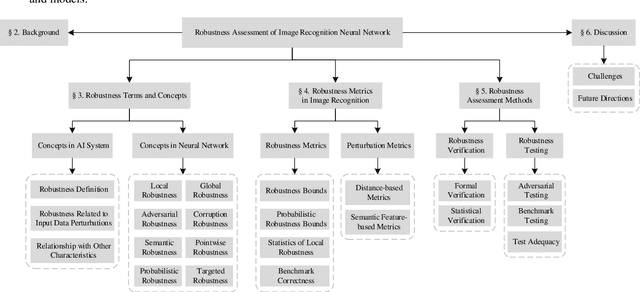
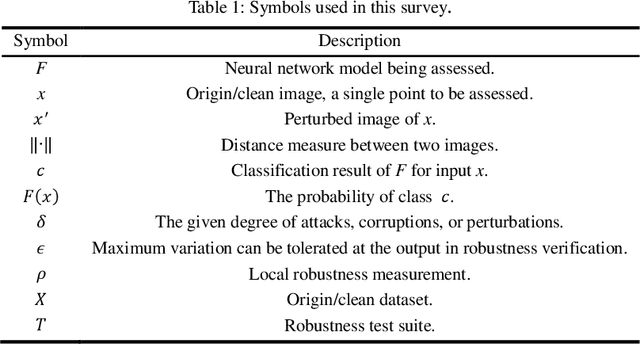
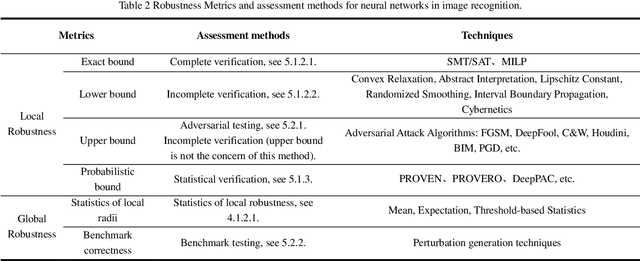
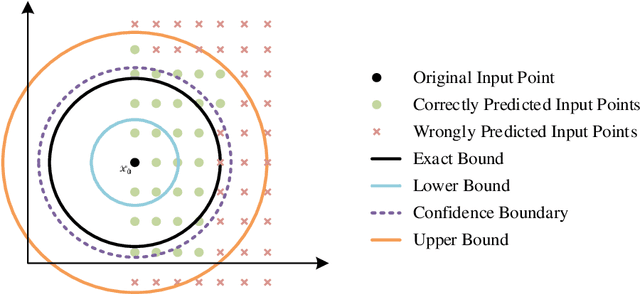
Abstract:In recent years, there has been significant attention given to the robustness assessment of neural networks. Robustness plays a critical role in ensuring reliable operation of artificial intelligence (AI) systems in complex and uncertain environments. Deep learning's robustness problem is particularly significant, highlighted by the discovery of adversarial attacks on image classification models. Researchers have dedicated efforts to evaluate robustness in diverse perturbation conditions for image recognition tasks. Robustness assessment encompasses two main techniques: robustness verification/ certification for deliberate adversarial attacks and robustness testing for random data corruptions. In this survey, we present a detailed examination of both adversarial robustness (AR) and corruption robustness (CR) in neural network assessment. Analyzing current research papers and standards, we provide an extensive overview of robustness assessment in image recognition. Three essential aspects are analyzed: concepts, metrics, and assessment methods. We investigate the perturbation metrics and range representations used to measure the degree of perturbations on images, as well as the robustness metrics specifically for the robustness conditions of classification models. The strengths and limitations of the existing methods are also discussed, and some potential directions for future research are provided.
 Add to Chrome
Add to Chrome Add to Firefox
Add to Firefox Add to Edge
Add to Edge